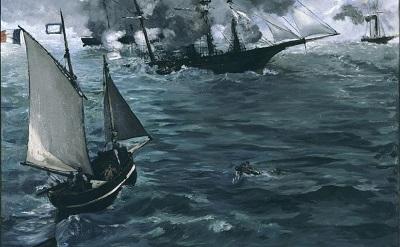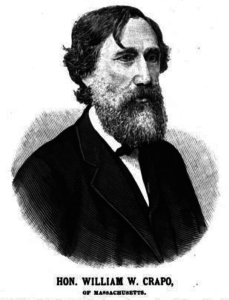
The UVA Law Library and the John L. Nau III Center for Civil War History are pleased to announce the C.S.S. Alabama Claims Cases Transcription Project. The over 100 documents in this collection center on the life and death of the British-built commerce raider C.S.S. Alabama and her sister ships, the C.S.S. Florida and the C.S.S. Shenandoah. Constructed in Liverpool, England in 1862, the Alabama disrupted Union commerce and supply lines in both Atlantic and Pacific waters during the Civil War. Between 1862 and 1864, Captain Raphael Semmes and the Alabama’s crew conducted seven major raids in waters ranging from the Gulf of Mexico to the Java Sea. They attacked or destroyed nearly seventy Union merchant ships, capturing or burning millions of dollars’ worth of cargo before the U.S.S. Kearsarge sank the Alabama on June 19, 1864 off the coast of France.
The Alabama’s success as a commerce raider made for a point of contention between the United States and Great Britain. After the war the American government held its British counterpart liable for damages. American citizens sought compensation for property lost to these British-built Confederate vessels. In 1871, the two nations signed the Treaty of Washington, which established an international arbitration process for resolving these disputes. The treaty marked a significant development in modern international law. In the end, the British government paid the United States $15.5 million in damages.

The C.S.S. Alabama Claims Cases Transcription Project features 108 documents from the law practice of Boston attorney and future U.S. Congressman William W. Crapo. Between 1870 and 1876, Crapo (pronounced “Cray-poe”) corresponded with numerous individuals such as attorneys Henry A. Barling and A. H. Davis as he worked to secure restitution from the British government on behalf of his clients. He also worked with bankers, insurance officials, and individual claimants. The letters and telegrams record how lawyers lobbied Congress and President Ulysses S. Grant’s administration as they pursued claims against the British government. They offer a unique perspective on the Civi War’s legal and diplomatic legacy.
UVA Law librarians completed an initial transcription of the Crapo material in the early 1990s. We now seek eagle-eyed members of the community to help refine that earlier work using Fromthepage.com, a crowdsourcing transcription platform to help enable their discovery and use by researchers. As far as we are aware, historians have never cited this collection in any scholarly research.
Here is but one example:

Henry A. Barling [New York] to William W. Crapo [New Bedford, Massachusetts]
13 December 1870
Confidential
New York Decemr. 13 1870
Dear Sir,
I infer from the tenor of yours of yesterday that the “Sufferers” may fly the track on the proposition of Johnson & Higgins, for two reason’s, the first on account of the compensation & next because of a hesitancy most people have of giving Powers of Atty. even to their intimates. Johnson & Higgins I know to be honorable people & ones that would not abuse a trust — still, you could get a power where they could not because every claimant in N.B. has confidence in you.
Now what I want to get at is, if we fail with J & H in getting what we aimed at the other day, I think I can suggest to you a plain (sic) that all the parties at interest will jump at, & in which your interests as well as our own can be as well cared for as by the arrangement now pending, but I will not suggest it now as it might be taken as a symptom of bad faith toward J. & H. — by whom I intend to stick until I see they cannot succeed & then if you will join B. & D we can, with proper energy, & I assume we both have enough of it, make a very handsome business of it.
What I have written you will of course consider as strictly confidential.
I remain
Dr. Sir
Yours truly
Henry A. Barling
W. W. Crapo Esqr
New Bedford
The above letter hints at discussions with clients concerning New York Insurance firm Johnson & Higgins. Barling’s plea for secrecy suggests a strategy in flux as the lawyers navigated complex legal and political shoals. The remaining papers in the collection describe in detail how lawyers and their clients negotiated deals and lobbied powerful individuals in defense of their legal interests.
Correcting the transcriptions will provide new insight into the Civil War era and the legal world it created. To start transcribing, visit the project’s webpage and signup for a free account on FromThePage. Participants in this project will find a complete set of instructions on the project website. Once finished, the UVA Law Library will make the completed transcriptions available on its website.
Questions? Please contact archives@law.virginia.edu.
Further Reading:
Charles C. Beaman, Jr. The National and Private “Alabama Claims” and Their “Final and Amicable Settlement” (Washington, D.C., 1871).
Charles S.C. Bowen. The “Alabama” Claims and Arbitration Considered from a Legal Point of View (London, 1868).
Adrian Cook. The Alabama Claims: American Politics and Anglo-American Relations, 1865-1872 (Ithaca, NY, 1975).
James McPherson. War on the Waters: The Union and Confederate Navies, 1861-1865 (Chapel Hill, 2012).
Frank J. Merli. Great Britain and the Confederate Navy, 1861-1865 (Bloomington, 1970).
This blog post was originally published on MoreUs the Blog of the Arthur J. Morris Law Library.
Images: (1) Édouard Manet, The Battle of the Kearsarge and the Alabama, 1864 (John G. Johnson Collection, Philadelphia Museum of Art, Public Domain); (2) William Crapo, printed in Phineas Camp Headley, Public Men of To-day, 1882; (3) Henry Barlow to William Crapo, 13 December 1870, Special Collections, UVA Law Library.
